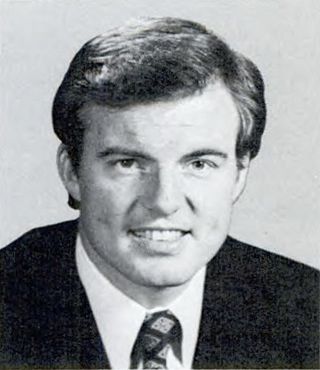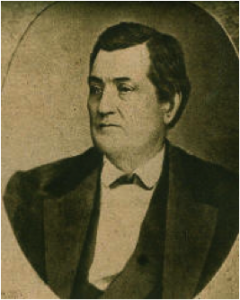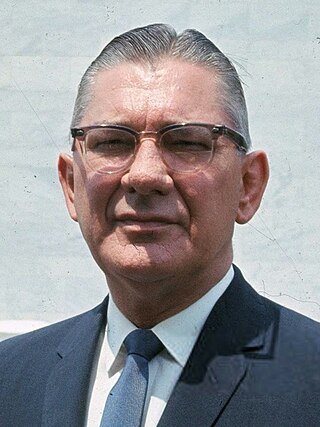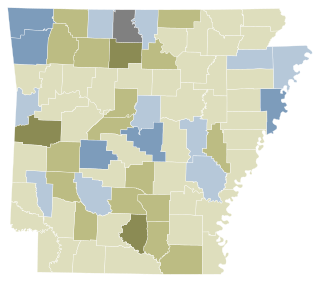Related Research Articles

Charles Evans Hughes Sr. was an American statesman, politician, academic, and jurist who served as the 11th chief justice of the United States from 1930 to 1941. A member of the Republican Party, he previously was the 36th governor of New York (1907–1910), an associate justice of the Supreme Court (1910–1916), and 44th U.S. secretary of state (1921–1925). As the Republican nominee in the 1916 presidential election, he lost narrowly to Woodrow Wilson.

Searcy County is a county located in the U.S. state of Arkansas. As of the 2020 census, the population was 7,828. The county seat is Marshall. The county was formed December 13, 1838, from a portion of Marion County and named for Richard Searcy, the first clerk and judge in the Arkansas Territory. The city of Searcy, Arkansas, some 70 miles away, shares the name despite having never been part of Searcy County. The county is an alcohol prohibition or dry county.

Baxter County is a county in the U.S. state of Arkansas. As of the 2020 census, the county's population was 41,627. The county seat is Mountain Home. It is Arkansas's 66th county, formed on March 24, 1873, and named for Elisha Baxter, the tenth governor of Arkansas.

Searcy is the largest city and county seat of White County, Arkansas, United States. According to 2019 Census Bureau estimates, the population of the city is 23,767. It is the principal city of the Searcy, AR Micropolitan Statistical Area which encompasses all of White County. The city takes its name from Richard Searcy, a judge for the Superior Court of the Arkansas Territory. A college town, Searcy is the home of Harding University and ASU-Searcy.

James Guy Tucker Jr. is an American former politician, businessman, and attorney who served as the 43rd governor of Arkansas from 1992 until his resignation in 1996 after his conviction for fraud during the Whitewater affair. A member of the Democratic Party, he previously served as the 15th lieutenant governor, state attorney general, and as a U.S. representative.

The Brooks–Baxter War, also known as the Brooks–Baxter Affair, was an attempt made by failed gubernatorial candidate Joseph Brooks of the “Brindle-tail” faction of Arkansas' Republican Party to take control of the state from Elisha Baxter, who was the Republican governor. The victor in the end was the Baxter administration, also known as the "Minstrels", supported by "carpetbaggers" over the Brindle-tails supported by "scalawags" and "freedmen".

Elisha Baxter was an American businessman and politician who served as the 10th governor of Arkansas from 1873 to 1874.

Augustus Hill Garland was an American lawyer and Democratic politician from Arkansas, who initially opposed Arkansas' secession from the United States, but later served in both houses of the Congress of the Confederate States and the United States Senate, as well as becoming the 11th governor of Arkansas (1874–1877) and the 38th attorney general of the United States (1885–1889). He wrote several books.

Wilbur Daigh Mills was an American Democratic politician who represented Arkansas's 2nd congressional district in the United States House of Representatives from 1939 until his retirement in 1977. As chairman of the House Ways and Means Committee from 1958 to 1974, he was often called "the most powerful man in Washington".
Harding University is a private university with its main campus in Searcy, Arkansas. It is the largest private university in Arkansas. Established in 1924, the institution offers undergraduate, graduate, and pre-professional programs. The university also includes the Harding School of Theology, located in Memphis, Tennessee, which was formerly known as Harding Graduate School of Religion. Harding is one of several institutions of higher learning associated with the Churches of Christ.

Marvin Ray Baxter is a former Associate Justice of the Supreme Court of California who served from January 1991 to January 5, 2015.

Edwin Ruthvin Bethune Jr., known as Ed Bethune, is an American lawyer, lobbyist, and novelist in Little Rock, Arkansas, who was a Republican member of the United States House of Representatives from Arkansas from 1979-1985.

The University of Arkansas School of Law is the law school of the University of Arkansas in Fayetteville, Arkansas, a state university. It has around 445 students enrolled in its Juris Doctor (J.D.) and Master of Law (LL.M) programs and is home to the nation's first LL.M in agricultural and food law program. The School of Law is one of two law schools in the state of Arkansas; the other is the William H. Bowen School of Law.
Bill Clinton served as the 42nd president of the United States (1993–2001) and as the 40th and 42nd governor of Arkansas. A member of the Democratic Party, Clinton first ran for a public office in 1974, competing in the congressional election for Arkansas's 3rd congressional district. After narrowly losing to incumbent representative John Paul Hammerschmidt, he ran for the office of Arkansas Attorney General in 1976. He won the Democratic primary comfortably, receiving over 55% of the popular vote. Witnessing his strong support during the primaries, Republicans did not nominate a candidate to run against him. Clinton won the general election unopposed. His experience as the attorney general was considered a natural "stepping-stone" to the governorship.
James Robert Hannah was an American jurist. After attending college and law school at the University of Arkansas in Fayetteville, Hannah opened a private law practice in Searcy. He practiced law for a decade, entering public service in part-time city attorney and city judge roles in small towns across the Arkansas Grand Prairie. He won election as Chancery Judge of the 17th District in 1979, and held the position until 1999, when he was nominated to the Arkansas Supreme Court. He served as an associate justice for four years, becoming chief justice in 2005. Hannah held the top position for ten years, until resigning in 2015.
Robin French Wynne was an American judge. He served as a justice on the Arkansas Supreme Court from 2014 until his death. He had previously been a judge on the Arkansas Court of Appeals, District 5 from 2011 until being sworn into the Arkansas Supreme Court in 2015. Prior to serving on the Court of Appeals, he was the Dallas County District Judge between 2004 and 2010.
Norman Dale Price was a justice of the Arkansas Supreme Court in 1990.
David Ray Cook is an American educator and politician who served three terms in the Arkansas House of Representatives. A Vietnam veteran, former public school administrator, and member of the Democratic Party, he was first elected to the House in 2004. In 2010, he sought the Democratic congressional nomination in Arkansas's 1st district, ultimately placing third in a crowded primary.

1990 Arkansas Amendment 3 was a ballot measure on the November 6, 1990, general election ballot to amend the Constitution of Arkansas to repeal Amendment 44, which was intended to allow the state to nullify federal integration laws. Amendment 44 had previously been overturned in 1989 by a federal court, but was still part of the state constitution. The ballot measure passed with 50.96% of the vote, repealing Amendment 44.
Thomas Arthur Glaze was an American lawyer. He served as a justice of the Arkansas Supreme Court from 1987 to 2008.
References
- 1 2 "Darrell David Hickman (1935–)". Encyclopedia of Arkansas . Retrieved December 19, 2020.
- ↑ "City Races", Baxter Bulletin (November 4, 1976), p. 2.
- ↑ "Hickman resigns court post, cites burnout", Baxter Bulletin (February 22, 1990), p. 2.